Lowell, Massachusetts, on the Merrimack River, was founded in the 1820s as a textile manufacturing center.
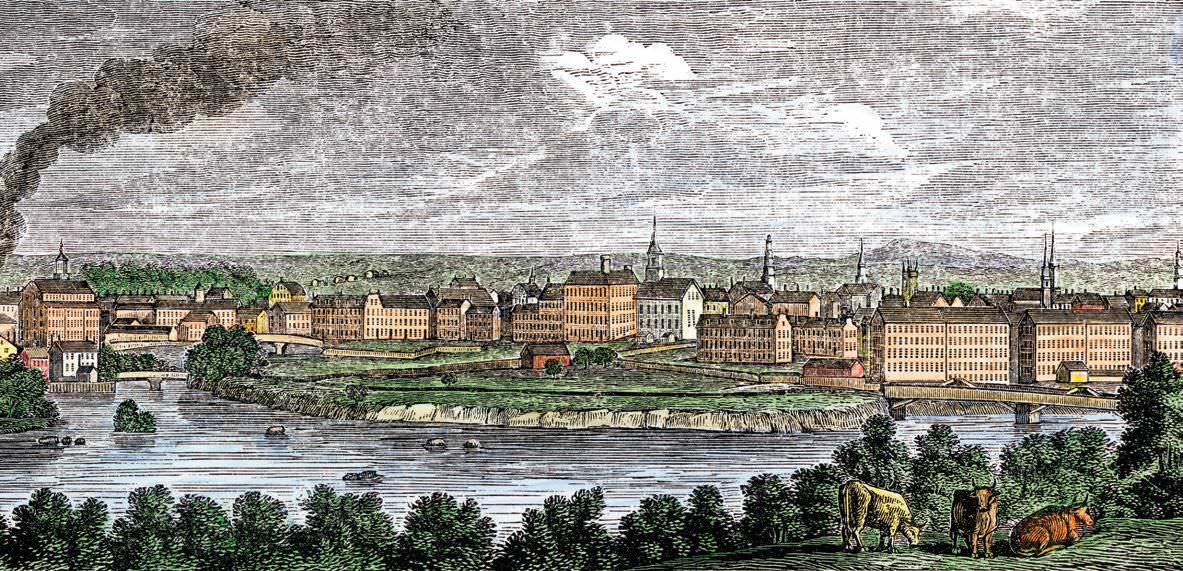
Powered by the river’s 30-foot waterfall, the great mills housed thousands of machines that processed raw cotton into thread and then wove the thread into cloth.
Mill owners needed many workers to operate those machines, but they didn’t want to pay too much for labor. They found the perfect labor force—mostly teenage girls and young women from the farms of New England. Life on farms had given girls and women experience in cloth production. They saw mill work as a way to help their families by sending money home as well as an opportunity to earn a little money of their own.
To help attract female workers, mill owners built boardinghouses near the mills. A respectable older woman called the boardinghouse keeper ran the house. She monitored the girls’ activities and was required to report any bad behavior to mill management.
Work at the mills was tightly managed and monotonous. The girls signed a contract that bound them to follow the company’s rules and to work six days a week, 12 to 14 hours a day, for at least one year. They were on their feet all day.
Grace, the 14-year-old girl in the following story, comes from a farm. She is a fictional character, but her story is based on the actual experience of mill girls.
Lowell, Massachusetts - September 21, 1835
Dear Mama,
I am arrived in Lowell at last. My, what a lot I h ave to tell you!
The journey here seemed mighty long. Bumping along in the wagon and then the train, I couldn’t help but think how every mile w as carrying me farther away from home.
Denne historien er fra July/August 2017-utgaven av Cobblestone American History Magazine for Kids.
Start din 7-dagers gratis prøveperiode på Magzter GOLD for å få tilgang til tusenvis av utvalgte premiumhistorier og 9000+ magasiner og aviser.
Allerede abonnent ? Logg på
Denne historien er fra July/August 2017-utgaven av Cobblestone American History Magazine for Kids.
Start din 7-dagers gratis prøveperiode på Magzter GOLD for å få tilgang til tusenvis av utvalgte premiumhistorier og 9000+ magasiner og aviser.
Allerede abonnent? Logg på
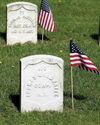
Putting the Pieces Together
Americans needed to begin to put the past behind them, come together, and plan for the future in the spring of 1865. But Abraham Lincoln, the man best equipped to lead them and who had hoped to restore the country as smoothly and peacefully as possible, had been assassinated.

LAST SHOTS
The last Confederate forces in the Civil War didn’t surrender in the spring of 1865 or on a battlefield.
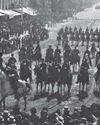
AND IN OTHER 1865 NEWS
A group of African Americans stop at the White House’s annual public reception on January 1, where they shake hands with President Abraham Lincoln.
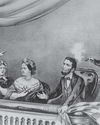
A Plot to Kill President the
For several months, actor John Wilkes Booth’s band of conspirators had plotted to capture President Abraham Lincoln and hold him hostage in exchange for Confederate prisoners.
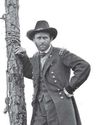
Let the Thing Be Pressed
In June 1864, Union Lieutenant General Ulysses S. Grant began a nearly 10-month campaign in Virginia.
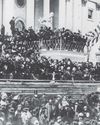
HEALING THE NATION
President Abraham Lincoln took the oath of office for the second time on March 4, 1865.

A Helping Hand
The spring season is hard in any agricultural society. Plants and animals are too small to eat.
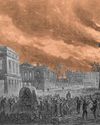
WAR SHERMAN-STYLE
As far as Union Major General William T. Sherman was concerned, the Civil War had gone on long enough.
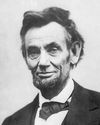
PEACE TALKS
The fall of Fort Fisher made clear that the Confederacy’s days were numbered. Southerners were tired and hungry.
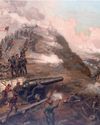
FORT FISHER'S FALL
Outnumbered Confederate soldiers inside Fort Fisher were unable to withstand the approach of Union troops by land and the constant Union naval bombardment from the sea.